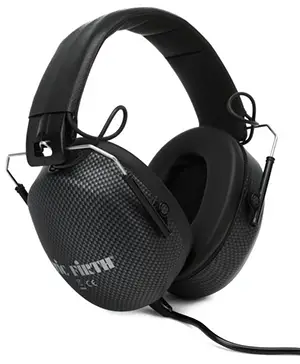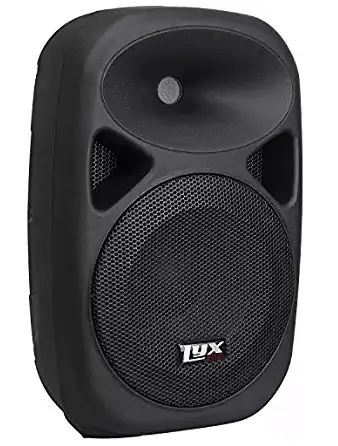
In my experience, there are two kinds of practice for drummers. The first is the arduous, tedious practice session where you are working on rudiments, technique and general improvement. The second is (for me anyway) much more fun as you can crank up your favorite tunes, play along behind your kit and pretend that you are a rock star! The problem is that it’s not always easy because of the volume of your drums in relation to the music source.
Wearing sound isolating headphones is by far the most effective way of playing drums along with your favorite music. Setting up PA speakers pointed at your playing position is another option, though this method could be detrimental to your hearing if you aren’t wearing earplugs.
Additionally, it is recommended that you record yourself playing along to music so that you can watch it back and make any necessary adjustments to your playing technique and style.
It’s a subtle but important art form which took me years to master. Before I paid much attention to proper hearing protection and technique maintenance, I actually digressed as a drummer and did a bit of damage to my journey as a musician. I don’t want the same thing to happen to you – so here are my tips to avoid the same mistakes I made.
How To Listen To Music While You Play
First off, it’s important to note that with an electronic drum set, playing along with music is simply accomplished by plugging your music source into the drum module and adjusting the levels. As such, this section focuses on accomplishing this feat with an acoustic (i.e. loud) drum kit.
There are three basic options for how to physically accomplish this with an acoustic drum set and have the music and your drumming be of equal volume at your ears:
Noise Reduction Headphones:
This is probably my favorite option (and likely the least expensive as well) because it involves only one piece of additional gear: a set of noise reduction headphones which you can plug into any audio player.

With these headphones, you’ll have the double benefit of wearing hearing protection while at the same time being able to pump any music or metronome into the headphones themselves. You’ll adjust the mix of your playing and the music by adjusting the volume on your audio player.
I have written about these headphones several times on this site, but it’s worth repeating that I’m a huge fan of the Drummer Headphones made by Vic Firth as they are relatively inexpensive and do a really good job of isolation and providing good quality audio.
as they are relatively inexpensive and do a really good job of isolation and providing good quality audio.
Reduce The Volume of Your Kit:
If you have a sound system or stereo in the room, another great option is to reduce the volume of your drums in the room so that you can easily listen to the audio coming from the system without drowning it out with your playing.
This can be accomplished in several ways and I’ve written a full article about how to dampen your drums , but a couple of the most common ways are:
, but a couple of the most common ways are:
- Use mesh drum heads on your drums and low volume cymbals
- Add mutes to your drum kit
- Use a practice drum kit (essentially a drum set made of practice pads)
These solutions will allow you to sufficiently reduce the volume of your drum set so that you don’t have to crank your music and you likely won’t have to wear hearing protection as well (although it really is a good idea anytime drums are involved).
Amplify The Music:
This option involves amplifying the music in such a way that it won’t get drowned out by a full-volume drum set. This will likely involve having some sort of PA (public address system) on hand to sufficiently amplify your tunes.

Additionally, you will absolutely need hearing protection for this option and if you have neighbors anywhere in vicinity to you – you’ll need to soundproof your practice room very well as the volume coming from it will likely be pretty intensely loud.
Because of the PA and the soundproofing necessary for this option, I’m quite certain that this option for playing along with music will also be the most expensive one to pursue.
Don’t Let Technique Fly Out The Window
You’ve (hopefully) been spending a lot of practice time working on detailed things like finger control, your drum rudiments, playing posture and other nit picky items which drummers worry about.
Unfortunately, the tendency is to ignore all of that hard work and let technique suffer when you crank up the tunes and start jamming along! Don’t fall victim to this trap as it will negate the hard work you’ve been putting in on your triple ratamacues!
Playing along with music is a way to break up the monotony of practice sessions, have a bit of fun but also reinforce what you’ve been learning. It sounds very simple, but it took me a long time to really master the art of applying the technical aspects of what I was learning to my jam sessions with Metallica’s Master of Puppets album.
Luckily, this application of technique to your play-along sessions is usually handled by simply setting forth a plan prior to playing and being conscious about your technique during practice. I actually used to force myself to re-start a particular song when I caught myself straying from proper technique as a form of ‘punishment’.
Song Selection
If you’re taking lessons with a drum instructor, you’ll want to work collaboratively with them to select specific songs which will help you with whatever techniques you are working on building. This will ensure that you are practicing things which will help you build your craft.
It’s often the case that your drum instructor will share similar musical interests, in which case selecting a song that both of you enjoy should be quite simple. Don’t be afraid to branch out though and try playing to a song which you might not otherwise select. This is especially useful in training to be a professional drummer as there are a lot of paid gigs which will require you to play styles you may not necessarily listen to for fun.
If you aren’t currently taking lessons, you’ll still want to pay special attention to song selection. It’s not enough just to pick songs which are merely fun – but you’ll want to select music which contains specific passages or skills which you want to work on.
Quick Tip:
It is quite likely that you’ll need to take a passage which you’re having trouble with and practice it at slower tempos without the music in order to gradually work it up to tempo.
Record Yourself!
It’s painful sometimes, but regardless of whether you’re playing along to tunes or not, it is probably the most impactful way which you can improve your playing and correct potentially harmful mistakes.
I can’t tell you how many times I’ve sat behind a drum kit and played, thinking that I was sounding phenomenal, only to discover that timing and sound quality were actually all over the place when I went back and listened to the recording.
It’s such a sinking feeling, until you re-train your brain a bit. While tricky to accomplish at times, it is an awesome tool in your tool belt to be able to turn that disappointment into opportunity. It’s not every day that someone comes along and tells you exactly what you’re doing wrong. In this case, it’s not a person but rather a recording (audio or video), which is clearly pointing out your flaws and making it EASY to correct them! How awesome is that!
Related Questions
How long should you practice drumming every day? A one hour practice session can product great results though as little as 30 minutes up to about 4 hours can also be quite effective. After four hours, it is quite likely that the practice quality will suffer and you won’t get the returns you are wanting.
Where can I find songs without drums for practice? While there are a few resources out there which specifically cater to providing drum-less versions of your favorite songs, my top recommendation is to go to YouTube and search for the song you want ‘without drums’.
and search for the song you want ‘without drums’.
